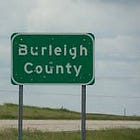Burleigh County: Previous Auditor Advocated For Reform
In a document from 1998, former Burleigh County Auditor Kevin Glatt advocated for restructuring of county government; in Burleigh County and statewide. His suggestions had been ignored, until now.
I’ve written extensively about the Burleigh County situation in recent months.
And the North Dakota Watchdog Network will be hosting a Townhall Meeting at the Bismarck Public Library on February 20th, 2025 at 6pm.
Since that last article, I was directed to a document written by former Burleigh County Auditor Kevin Glatt in 1998, which was his thesis whi…
Keep reading with a 7-day free trial
Subscribe to North Dakota's Watchdog Update to keep reading this post and get 7 days of free access to the full post archives.






